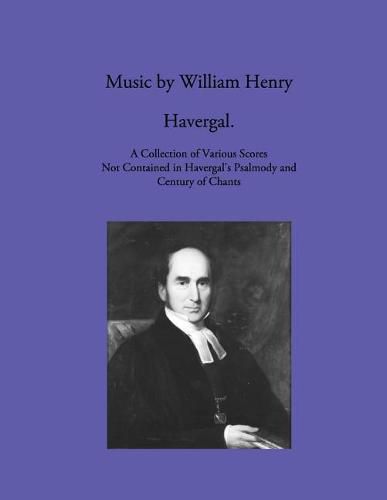Music by William Henry Havergal
William Henry Havergal

Music by William Henry Havergal
William Henry Havergal
William Henry Havergal (1793-1870) was a pastor, musician, scholar, and an example of the believer. His sermons are true gold, so good, fully at the level of rich benefit of sermons by J. C. Ryle, Charles Spurgeon, and D. Martyn Lloyd-Jones. Accounts of his pastoral ministry are true examples, a heart work, glowing the Lord and His truth. W.H.H. was a musician to the core, a rarely and finely gifted one. (His youngest daughter, Frances Ridley Havergal, was the same.) He was a master at the keyboard (his improvisations were profoundly rich), he had a fine, beautiful voice, and he composed valuable scores. He was also a scholar of music, and was consulted by many for information or advice. Early in his life, he was offered a professorship in music at Oxford University, a very high honor in that day, but he declined that and a career in music to be a pastor. Few could so well compose music, yet he preferred to write a sermon than to compose a score. Though music was so very important to him, and he used music to enrich his ministry and benefit his hearers (he was the music leader in the churches he pastored), yet music was a secondary pursuit to him, and an enjoyment and relaxation, not his priority, unless his physical health precluded pastoral work. Though his priority was pastoral work, he was the foremost church musician in England in his generation (Dr. William Crotch was the generation before W.H.H., and William Sterndale Bennett was not primarily a church musician), and was very highly regarded by knowledgeable people for his compositions and his knowledge of music. W.H.H. was awarded the Gresham Prize twice, in 1836 and in 1841. After that, the judges concluded that no one should be allowed to win that prize more than twice. The American music leader Lowell Mason, in his second trip to England, in 1850. visited William Henry Havergal in Worcester, where W.H.H. was both the pastor (Rector) and music leader of St. Nicholas Church; Mason said that W.H.H.‘s church music was the best that he heard, excellent in all particulars and far in advance of anything that he heard in England. W.H.H. led the reform of church music, and few today realize the value of his efforts and publications to improve the practice of music in church worship. He was also a finely gifted poet, leaving richly edifying poems and hymns, and a generous-though not complete-number of his poems are given in Volume I of The Complete Works of Frances Ridley Havergal. William Henry Havergal preached more than 2,000 sermons over more than five decades (likely approaching or exceeding 3,000 sermons, based on his handwritten record of his sermons from 1816 to 1869), each sermon a true labor of love, a heart work. This new book of Music by William Henry Havergal contains a generous-though not nearly complete-number of his published scores not included in Havergal’s Psalmody and Century of Chants, and this new book also includes his edition of Thomas Ravenscroft’s Psalter (London: Novello, 1845), and his musicological treatise A History of the Old Hundredth Psalm Tune (New York: Mason Brothers, 1854).
This item is not currently in-stock. It can be ordered online and is expected to ship in approx 2 weeks
Our stock data is updated periodically, and availability may change throughout the day for in-demand items. Please call the relevant shop for the most current stock information. Prices are subject to change without notice.
Sign in or become a Readings Member to add this title to a wishlist.


